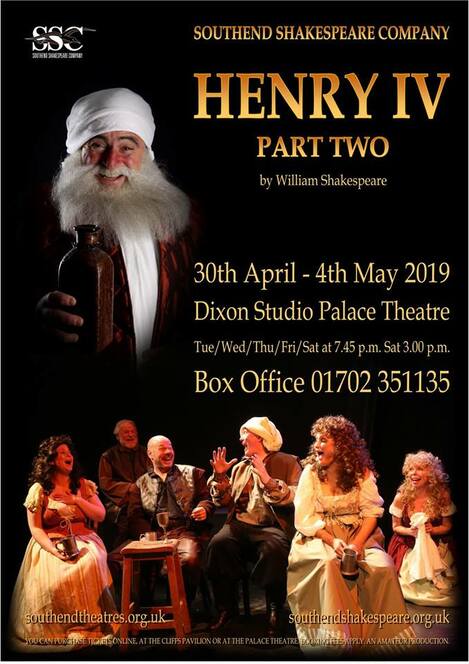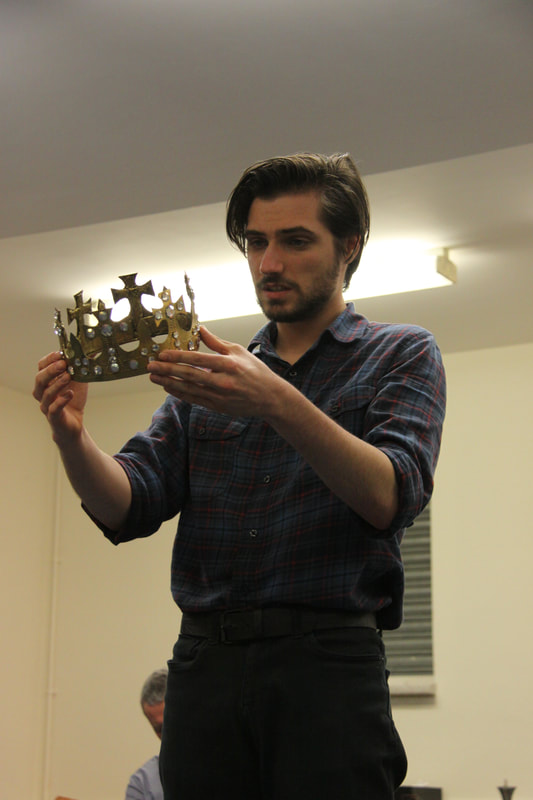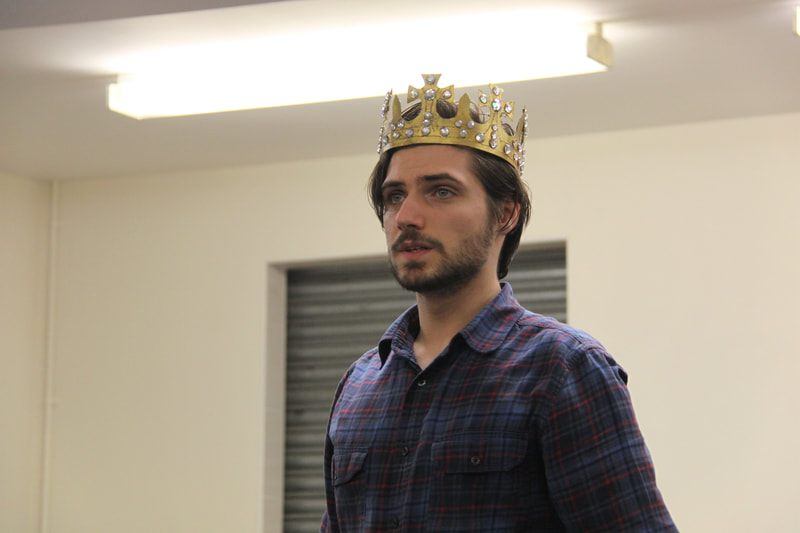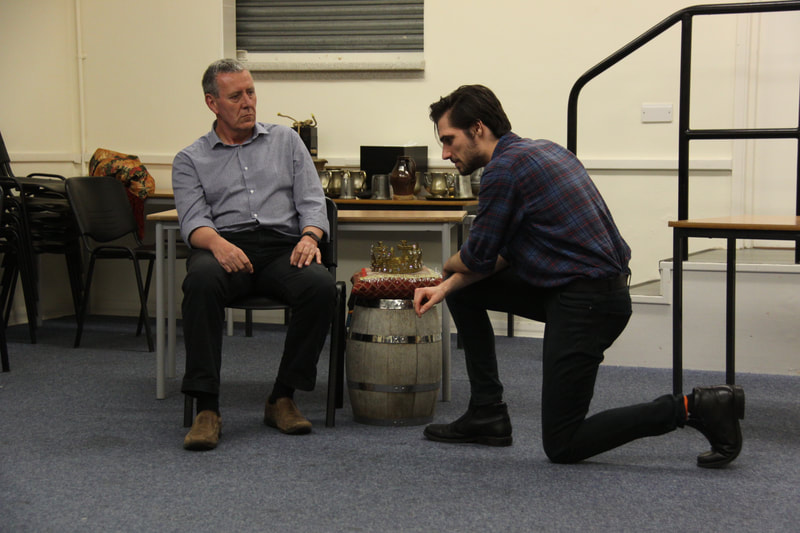REVIEW
HENRY IV Part Two
Southend Shakespeare Company
Dixon Studio Palace Theatre, Westcliff on Sea
30th April - 4th May 2019
HENRY IV Part Two
Southend Shakespeare Company
Dixon Studio Palace Theatre, Westcliff on Sea
30th April - 4th May 2019
NEVER short of ambition, Southend Shakespeare Company continues its comprehensive staging of Shakespeare's epic cycle of historical drama, this time with Henry IV Part Two.
A work of genius, even by Bard standards, Henry IV Part Two adds another, final, chapter to the story of what happened to the usurper king of the title (Dave Lobley) once he had gained the crown.
The theme soon becomes apparent, and it is unchanged since the first part of Henry IV, presented by SSC in November. That golden orb of power brings little joy to its wearer. The ex-rebel now finds his monarchy split asunder by other rebels. The king may wear the crown, but he is ill, tired and conscious that he does not have much longer to live.
Above all, the conflict with his wastrel son and heir Hal continues to torment him. Hal, it seems, can hardly wait for his dad to die, so that he can inherit the monarch's role. How is King Henry to know that Hal is already transforming into the future Henry V, victor of Agincourt and European statesman of enduring renown?
Yet, like Part 1, this is really a story about another, and far less noble, character. The magnificent figure of Sir John Falstaff, hailed by J.B. Priestley as “the greatest comic character ever born out of the human imagination,” continues to dominate the narrative.
A large part of the play is devoted to Falstaff's antics as a recruiting agent for the king's army. We find him in the wilds of Gloucestershire, choosing soldiery from the ranks of the local yokels.
Falstaff, naturally, looks upon this role as a chance to sponge off, and fleece, everyone around him. SSC players lap up the comic opportunities provided by this sequence. The motley parade of rural raw recruits is a total hoot. (Also excelling herself in this scene is costumier Madeleine Ayres).
The yokels are overseen by two new characters, the local dignitaries Shallow and Silence. To describe the pair as doddery, mentally and physically, would be an insult to Zimmer frames everywhere. James Carter and Ian Downie set up an hilarious double-act as the two decaying landowners, differentiated only by Shallow's greater – and wholly misplaced – self-confidence.
Yet while the rural scenes add extra comic weight to the play, they also serve to introduce a new note, more or less absent from the first part of Henry IV. Alongside the high drama and the comedy, we also become aware of a strain of wistful melancholy. Like old men everywhere, Shallow and Silence live largely in the past, and love to bore anyone within hearing distance with tales of their lusty youth.
Falstaff – a friend from their student days – also becomes caught up in this wistfulness, as the trio recall their days of youthful carousing, when they heard “the chimes at midnight”. In doing so they conjure up an almost unbearable sense of loss, the briefness of youth, and the fast onset of mortality.
This is compounded by Falstaff's own impending fate. Sir John, the great survivor, is riding for the ultimate fall. As Prince Hal's bosom pal and companion of his misspent youth, Falstaff expects to be in clover, once Hal inherits the crown. Instead, when Hal does become king, Falstaff is spurned, in the famous rejection scene - “I know thee not old man.” Humbled and humiliated, Falstaff becomes a diminished figure. He ages in front of our eyes, turns into an old man, with only a short while left to live.
But the production ends on high note. As the stage lighting switches to red and gold, director Malcolm Toll improvises a scene that looks ahead to the glories of Henry V's reign, and the soldier-king's great victory of Agincourt.
Henry IV Part 2 is just so much more than a history lesson. All aspects of human life are touched on in this magnificent play, and the SSC production does full justice to Shakespeare's creation in all its amplitude.
The cast leads are all reprising their roles from Henry IV Part One. They were all pretty good last time round, but familiarity with the roles has lent an extra depth.
Regarding the actor playing Falstaff, I too will perform a reprise, and simply repeat the original comment on his performance in November.
“It isn't so much a matter of Andrew Sugden playing Falstaff, more a case of Falstaff engulfing all original traces of Mr Sugden. Where once there was an actor, now there is just the famous Fat Knight. The great portly body, the waddle, the wide face and wall of whiskers, the voice, with its infinite repertoire of pitches, from wheedle to boom, depending on the circumstances. This simply is Sir John, transported direct from Shakespeare's mind without touching the edges.”
Dave Lobley as the title character is again magnificent. He captures to perfection the brooding, the bitterness, the anguish and the disappointment of the ailing king. The one-time man of action has become a static, sick-bed figure, using words where once he used a sword. Mr Lobley's verse-speaking perfectly captures every nuance of the wordscape in which the king now resides.
Kim Tobin is again a delight as Mistress Quickly, the tavern landlady who acts as Falstaff's female foil, and, to some extent, nemesis. The character is often played as dim-witted, but Ms Tobin ratchets up the feistiness. Her Mistress Quickly is a ball of fury, who thinks nothing of beating Falstaff up.
The dynamic of the play remains the transformation of Hal from playboy to king, and Elliott Bigden once again emanates intelligence and stature as the monarch in the making. Cast and director mesh as a team, all clearly inspired by the material, so that by the ending, we truly do feel that we have lived through epic times.
Review: Tom King
Henry IV Part Two
Palace Theatre (Dixon Studio), Westcliff
Nightly at 7.45pm, until Sat May 4, matinee Sat Nov 24, 3pm
Box office: 01702 351135 southendtheatres.org.uk
A work of genius, even by Bard standards, Henry IV Part Two adds another, final, chapter to the story of what happened to the usurper king of the title (Dave Lobley) once he had gained the crown.
The theme soon becomes apparent, and it is unchanged since the first part of Henry IV, presented by SSC in November. That golden orb of power brings little joy to its wearer. The ex-rebel now finds his monarchy split asunder by other rebels. The king may wear the crown, but he is ill, tired and conscious that he does not have much longer to live.
Above all, the conflict with his wastrel son and heir Hal continues to torment him. Hal, it seems, can hardly wait for his dad to die, so that he can inherit the monarch's role. How is King Henry to know that Hal is already transforming into the future Henry V, victor of Agincourt and European statesman of enduring renown?
Yet, like Part 1, this is really a story about another, and far less noble, character. The magnificent figure of Sir John Falstaff, hailed by J.B. Priestley as “the greatest comic character ever born out of the human imagination,” continues to dominate the narrative.
A large part of the play is devoted to Falstaff's antics as a recruiting agent for the king's army. We find him in the wilds of Gloucestershire, choosing soldiery from the ranks of the local yokels.
Falstaff, naturally, looks upon this role as a chance to sponge off, and fleece, everyone around him. SSC players lap up the comic opportunities provided by this sequence. The motley parade of rural raw recruits is a total hoot. (Also excelling herself in this scene is costumier Madeleine Ayres).
The yokels are overseen by two new characters, the local dignitaries Shallow and Silence. To describe the pair as doddery, mentally and physically, would be an insult to Zimmer frames everywhere. James Carter and Ian Downie set up an hilarious double-act as the two decaying landowners, differentiated only by Shallow's greater – and wholly misplaced – self-confidence.
Yet while the rural scenes add extra comic weight to the play, they also serve to introduce a new note, more or less absent from the first part of Henry IV. Alongside the high drama and the comedy, we also become aware of a strain of wistful melancholy. Like old men everywhere, Shallow and Silence live largely in the past, and love to bore anyone within hearing distance with tales of their lusty youth.
Falstaff – a friend from their student days – also becomes caught up in this wistfulness, as the trio recall their days of youthful carousing, when they heard “the chimes at midnight”. In doing so they conjure up an almost unbearable sense of loss, the briefness of youth, and the fast onset of mortality.
This is compounded by Falstaff's own impending fate. Sir John, the great survivor, is riding for the ultimate fall. As Prince Hal's bosom pal and companion of his misspent youth, Falstaff expects to be in clover, once Hal inherits the crown. Instead, when Hal does become king, Falstaff is spurned, in the famous rejection scene - “I know thee not old man.” Humbled and humiliated, Falstaff becomes a diminished figure. He ages in front of our eyes, turns into an old man, with only a short while left to live.
But the production ends on high note. As the stage lighting switches to red and gold, director Malcolm Toll improvises a scene that looks ahead to the glories of Henry V's reign, and the soldier-king's great victory of Agincourt.
Henry IV Part 2 is just so much more than a history lesson. All aspects of human life are touched on in this magnificent play, and the SSC production does full justice to Shakespeare's creation in all its amplitude.
The cast leads are all reprising their roles from Henry IV Part One. They were all pretty good last time round, but familiarity with the roles has lent an extra depth.
Regarding the actor playing Falstaff, I too will perform a reprise, and simply repeat the original comment on his performance in November.
“It isn't so much a matter of Andrew Sugden playing Falstaff, more a case of Falstaff engulfing all original traces of Mr Sugden. Where once there was an actor, now there is just the famous Fat Knight. The great portly body, the waddle, the wide face and wall of whiskers, the voice, with its infinite repertoire of pitches, from wheedle to boom, depending on the circumstances. This simply is Sir John, transported direct from Shakespeare's mind without touching the edges.”
Dave Lobley as the title character is again magnificent. He captures to perfection the brooding, the bitterness, the anguish and the disappointment of the ailing king. The one-time man of action has become a static, sick-bed figure, using words where once he used a sword. Mr Lobley's verse-speaking perfectly captures every nuance of the wordscape in which the king now resides.
Kim Tobin is again a delight as Mistress Quickly, the tavern landlady who acts as Falstaff's female foil, and, to some extent, nemesis. The character is often played as dim-witted, but Ms Tobin ratchets up the feistiness. Her Mistress Quickly is a ball of fury, who thinks nothing of beating Falstaff up.
The dynamic of the play remains the transformation of Hal from playboy to king, and Elliott Bigden once again emanates intelligence and stature as the monarch in the making. Cast and director mesh as a team, all clearly inspired by the material, so that by the ending, we truly do feel that we have lived through epic times.
Review: Tom King
Henry IV Part Two
Palace Theatre (Dixon Studio), Westcliff
Nightly at 7.45pm, until Sat May 4, matinee Sat Nov 24, 3pm
Box office: 01702 351135 southendtheatres.org.uk
UNEASY LIES THE HEAD THAT WEARS A CROWN...
King Henry is trying to head off rebellions as he approaches his death. His son, Prince Hal, is waiting to take the crown and the old rogue, Sir John Falstaff, is cheating and robbing anybody he meets, regardless of rank or birth.
Rarely performed, Henry IV Part 2 is a great stand alone play, full of comedy and drama, with a mixture of noble characters and loveable rogues.
The SSC are delighted to bring this wonderful story to the Dixon Studio.
Do not miss this classic, rarely seen, Shakespeare play!
King Henry is trying to head off rebellions as he approaches his death. His son, Prince Hal, is waiting to take the crown and the old rogue, Sir John Falstaff, is cheating and robbing anybody he meets, regardless of rank or birth.
Rarely performed, Henry IV Part 2 is a great stand alone play, full of comedy and drama, with a mixture of noble characters and loveable rogues.
The SSC are delighted to bring this wonderful story to the Dixon Studio.
Do not miss this classic, rarely seen, Shakespeare play!
Below: Elliot Bigden in rehearsal alongside Dave Lobley who returns to his role of King Henry IV
For tickets to see Henry IV Part Two go to www.southendtheatres.org.uk or call the box office on 01702 351135



